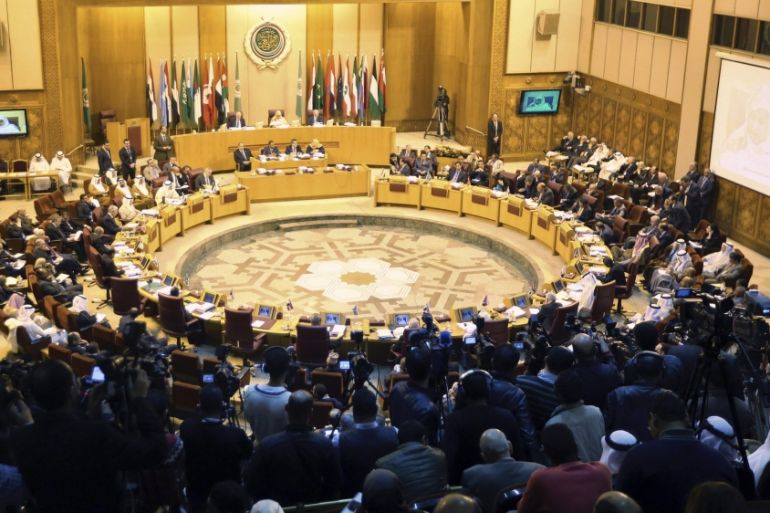Does the Arab League need an army?
Al Jazeera’s Imran Khan analyses the question in his weekly blog on security issues.

On Monday, the Arab League chief Nabil Al Arabi addressed delegates with a stark and potentially game changing request.
“There is an urgent need for the creation of a multi-purpose common Arab military force,” he said and although he didn’t specify what the need was, it was clear that he was talking about the Islamic State of Iraq and the Levant (ISIL).
Keep reading
list of 4 itemsMoscow theatre attack suspects show signs of beating in court
Four men showing signs of severe beating charged over Moscow concert attack
Russia mourns Moscow concert hall attack victims as death toll rises to 137
His words were met with murmured agreements. A logical move would be to build the force from a base of Egyptian forces, who have the largest standing arming in the league. But even that will be problematic given regional rivalries that have failed to agree on any kind of force since the idea was first mooted in 1965.
There’s no doubt, though, that Nabil Al Arabi is right when he suggests that more, not less, Arab co-operation is needed to defeat ISIL. But at the core of all of this is the Arab League itself.
Ineffectual union
In diplomatic circles, the Arab League is mocked for being ineffectual. That has only been brought into sharp focus over its inability to bring about a solution to the war in Syria that has dragged on now for four years.
The Arab League states pursue their own agenda’s ruthlessly, backing one armed group over another while Syria itself remains in turmoil. Even when the Arab League suspended Syria’s membership in 2011, other states blocked the opposition Syrian National Coalition (SNC) bid to take its place. Without being a member, Iran also exerted influence.
The kind of threat ISIL poses requires unified Arab thinking. But perhaps more than an Arab League army that has so far not been able to be formed, there are other ways that the Arab League could co-operate that could be far easier than forming a fighting force and perhaps far more effective.
One of ISIL’s biggest strengths is its ability to recruit and traverse borders. In that sense more intelligence co-operation and a centralised Intelligence gathering operation much like Europol in Europe or Interpol worldwide. Those agencies have the power to be able to issue notices about individuals that they’re interested in, have a mechanism to share intelligence about upcoming attacks, take steps to thwart potential threats quickly and easily, respecting all the while a country’s sovereignty underpinned by the trust that the individual government will act on that information.
That’s important. Within the Arab League states there is little appetite for even a sanctioned security force to act. Sectarianism plays a part in all of this. Shia-dominated Iraq, for example, would balk at the idea of a Sunni-dominated security force within its borders, and given that any potential force would be made up of Egyptian, Saudi, Jordanian and UAE troops this would also concern Iran, who exert influence in Damascus, Baghdad, Beirut and Sanaa.
Given those challenges an ‘Arabpol’ might be easier to set up and run than an Arab League army.
‘Arabpol’
The idea isn’t new. In 2008 at a meeting of regional police chiefs the idea was mooted. There’s also precedent for the enhanced policing operations. The Gulf states council, the GCC has a unified police force called GCC-POL and it seems to work but it’s mandate is limited to the GCC states, Qatar, the UAE, Saudi, Kuwait, Bahrain, and Oman. The GCC-POL co-operates with other policing organisations and with regional neighbours in limited capacity.
A truly effective ‘Arabpol’ would need a very clear charter that covered crime, terrorism, money-laundering and smuggling. If concentrated on ISIL, it could realistically make a dent in the group’s financial and recruitment operations and potentially provide a template for further enhanced co-operation, perhaps, eventually even a Nabili’s proposed pan Arab force.
But all of that is a long way away.
The intelligence services of the Arab states, in the same way as other states operate on clear policy of ‘enemies, foreign and domestic’. That is to say the threats within borders to the state. Each service would resist the idea of co-operation, lest it give away too much.
Human rights groups would also have a problem with co-operation between intelligence agencies, citing the illegal methods many of those groups claim the CIA and the Arab states used post 9/11 that included enhanced interrogation techniques, rendition, and illegal arrest.
Plenty of Arab leaders have criticised the Arab League, but perhaps now what is needed more than ever are small steps that build confidence and can turn the League into what its charter demands: “The League has as its purpose the strengthening of the relations between the member-states, the coordination of their policies in order to achieve co-operation between them and to safeguard their independence and sovereignty.”
With so many threats to the Arab world from ISIL, falling oil prices, Syria and so on, the Arab League provides the only forum for that could provide answers.
What shape that forum takes should be the only real question being asked and should be more focused than the call for a pan Arab army.